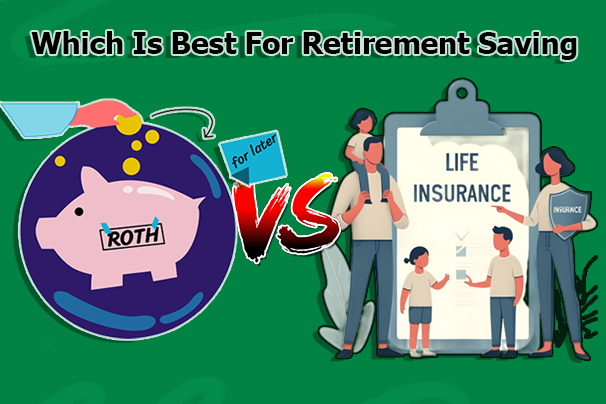IRA vs. Life insurance both assist you in making the best retirement saving decisions and ensuring that you have funds set aside. In addition, life insurance is excellent for estate planning, whereas a Roth IRA is ideal for retirement savings. Moreover, when it comes to saving your retirement years, IRA vs life insurance is generally considered the best.

IRA is a preferable choice for a retirement plan, as it can provide larger returns and tax-free growth. Its major goal is to develop a strong retirement fund, making it an appealing alternative if you want to accumulate money. A life insurance policy is a superior option for estate planning because it focuses on paying out death benefits to your loved ones after you die.
IRA Vs. Life Insurance: Which Is Best For Retirement Saving
It’s critical to comprehend the main differences between life insurance vs IRA when selecting the best between the two for retirement savings. Despite being financial products intended for long-term planning, they have diverse functions and function according to various principles. Furthermore, it’s crucial to understand the key differences between these solutions to make an informed decision.
What Is IRA
An individual retirement account (IRA) is a form of retirement savings vehicle that permits your investments to grow in a tax-efficient manner. They are an excellent long-term savings strategy for retirement. There are two kinds of IRAs, and they work slightly differently. These two main IRAs include traditional and Roth IRAs.
Additionally, traditional IRAs do not levy taxes on contributions. When you withdraw money in retirement, it is taxed like ordinary income. With a Roth IRA, the money you put in is already taxed, but it grows tax-free over time. If you are 59½ or older and have contributed to a Roth IRA at least five years ago, you can withdraw your gains tax-free. Both have advantages, although regular IRAs are more widespread.
What Is Life Insurance
Life insurance is most likely thought of as a way to shield your loved ones in case of an untimely demise. Although life insurance can be used for various purposes, it aids in risk management. In addition to paying a death benefit to the policy’s beneficiaries, permanent life insurance also has a cash value component that can grow tax-deferred over time.
Comparison of IRA Vs. Life Insurance
IRAs are optional and done on an as-needed basis with after-tax money. However, life insurance is planned and based on prearranged premium installments. Additionally, a portion of the premium for permanent life insurance, whether whole or universal, is invested in the cash value element of the policy.
For IRA
Minimum contribution
To open an IRA, there is no minimum amount to contribute. If your income satisfies the eligibility requirements, you can open an account. There is a maximum amount you can contribute annually, even though there are no minimum contribution requirements.
Maximum contribution
You can use your earned income to fund an IRA. Also, you can fund your account with up to $6,500 per year using after-tax money. You can contribute a $1,000 catch-up contribution if you are 50 years of age or older.
Frequency of contributions
You are free to make contributions at any time of the year; there is no deadline. However, if you intend to maximize your contributions, you must finish these by the deadline for filing your income tax return.
For Life Insurance
Minimum contribution
Your premiums are what add to the cash worth of your life insurance. Every time you make a payment, a portion of that goes toward your cash value, and the remaining portion is used to your death benefit. There isn’t a set proportion for the calculation, though.
Maximum contribution
If you pay more than the policy stipulates, you have the option to overfund your life insurance. With this method, you can contribute more to your financial value.
Frequency of contributions
Your life insurance policy’s cash value contributions are derived from your premium payments, so the frequency of your contributions is contingent upon your payment schedule.
Benefits of IRA Vs. Life Insurance
While both investment vehicles have advantages, there are differences between life insurance vs IRA. Three perks that you’ll probably gain from are how your money makes money, what your beneficiaries receive, and withdrawals.
Recall that while each operates differently, all three are feasible for IRAs and life insurance. See how the benefits of life insurance vs IRA vary below.
For IRA
Potential for savings
If saving for retirement is your primary goal, an IRA might be a better choice. It’s designed with individuals who wish to guarantee they have money by retirement in mind in mind. With an IRA, your chances of receiving larger returns are increased.
Death benefit
By opening an IRA, you can start saving money now, which, if you continue, can grow into a sizable sum by the time you retire. You will mostly use the money for yourself. You can designate someone to receive the remaining balance in your IRA upon your death, even though it does not offer a death benefit.
Withdrawals
IRA must be made using after-tax money since you are only allowed to use earned income. Your contributions are not deductible from taxes, but the money grows tax-free. After you become 59 years and six months old, you can continue to take withdrawals from your account without incurring taxes or penalties. However, there is a 10% penalty if non-qualified dividends are received; otherwise, they remain tax-free.
For Life Insurance
Potential savings
Permanent life insurance policies are the kind of life insurance that can assist you in reaching your financial objectives if you’re getting ready for retirement. Though they don’t include a cash value component, term life insurance policies are usually more popular. Cash value life insurance typically yields lesser returns than alternative investment options. When buying life insurance to supplement your retirement savings, keep in mind that returns are not always guaranteed and that you may lose money.
Death benefit
The main emphasis of life insurance policies is the death benefit. As long as the policy is still in effect, people typically buy plans to guarantee that their loved ones will have access to money in the event of the policyholder’s death. Depending on the coverage you choose when you buy the plan, the payment amount will vary.
Withdrawals
If your life insurance policy has a cash value component, you can typically withdraw funds from it. Savings are tax-free unless the cash value exceeds it, but may take two to five years to accumulate due to contributions from premium payments. Recall that taking out all of your money terminates your insurance, so be sure you have enough money if you choose to keep the coverage.
Final Thoughts
If your goal is to accumulate a nest egg, buying life insurance may not be the greatest choice, even though you might still think about doing so for retirement savings. If you have a Roth IRA already and have made the most of your annual contributions, it’s a great option.





